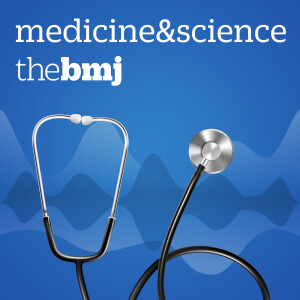
Medicine and Science from The BMJ
Health & Fitness:Medicine

Talk Evidence - evidence in Roe vs Wade, MI treatment variation, and tribal methodologies
 2022-05-23
2022-05-23
Helen Macdonald, The BMJ's research integrity editor is back with another episode, and this week is joined by Joe Ross, professor of medicine and public health at Yale, and US research editor for The BMJ, and Juan Franco, editor in chief of BMJ EBM, and Professor at the Instituto Universitario Hospital Italiano de Buenos Aires
In this episode they discuss;
The US supreme court looks set to overturn Roe v Wade, creating a patchwork of abortion provision across the U.S. We consider the role which evidence might play in documenting how health is affected by that decision, and whether medical evidence is being used at all in the debate.
We'll give you a quick update on treatment for Covid-19
We know that trials are needed for new treatments, but in the face of an exponentially growing amount of observational data, is it time for a shift in that certainty? Joe tells us about his research into whether trials and observational studies of three drugs in covid produce the same answer?
And finally, treatment variation - it's one of the things that helped kick-start the EBM revolution, but there's still much to learn. Juan describes some new research which examines how countries stack up when you compare their handling of and outcomes of a common condition such as a myocardial infarction.
Reading list;
Navigating Loss of Abortion Services — A Large Academic Medical Center Prepares for the Overturn of Roe v. Wade
https://www.nejm.org/doi/full/10.1056/NEJMp2206246.
A living WHO guideline on drugs for covid-19
https://www.bmj.com/content/370/bmj.m3379
Agreement of treatment effects from observational studies and randomized controlled trials evaluating hydroxychloroquine, lopinavir-ritonavir, or dexamethasone for covid-19
https://www.bmj.com/content/377/bmj-2021-069400
Variation in revascularisation use and outcomes of patients in hospital with acute myocardial infarction across six high income countries
view more
https://www.bmj.com/content/377/bmj-2021-069164
More Episodes
QI and improvement are not synonyms
 2020-01-31
2020-01-31
 2020-01-31
2020-01-31
Surviving childhood cancer treatment
 2020-01-21
2020-01-21
 2020-01-21
2020-01-21
Michael West - GMC Report On Wellbeing
 2020-01-10
2020-01-10
 2020-01-10
2020-01-10
Editors pick of education in 2019
 2020-01-03
2020-01-03
 2020-01-03
2020-01-03
Talk Xmas Evidence
 2019-12-31
2019-12-31
 2019-12-31
2019-12-31
The need for (psychiatrists’) speed
 2019-12-20
2019-12-20
 2019-12-20
2019-12-20
Talk Evidence - Talking about harms
 2019-12-13
2019-12-13
 2019-12-13
2019-12-13
012345678910111213141516171819
Create your
podcast in
minutes
- Full-featured podcast site
- Unlimited storage and bandwidth
- Comprehensive podcast stats
- Distribute to Apple Podcasts, Spotify, and more
- Make money with your podcast
It is Free
- Privacy Policy
- Cookie Policy
- Terms of Use
- Consent Preferences
- Copyright © 2015-2024 Podbean.com




